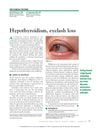
Search
for
Sort by
Research
30-60 / 1000+ results

research A Rare Cutis Verticis Gyrata Secondary to Cerebriform Intradermal Nevus: Case Report and Literature Review
A man's unusual scalp folds caused by a skin condition were treated with surgery and remained unchanged two years later.

research Efficacy of Tofacitinib in Treatment of Alopecia Universalis in Two Patients
Tofacitinib was effective in treating hair loss in two patients with alopecia universalis.

research Functional Ectodermal Organ Regeneration as the Next Generation of Organ Replacement Therapy
The document concludes that regenerating functional ectodermal organs like teeth and hair is promising for future therapies.

research Alopecia Following Oral Acyclovir for the Treatment of Herpes Simplex Keratitis
A woman lost her hair after taking acyclovir, but it grew back when she stopped the medication.

research Lash Ptosis in Congenital and Acquired Blepharoptosis
Lash ptosis is more common and severe in people with congenital eyelid droop than in those with acquired eyelid droop or without eyelid droop.

research Cognitive, Emotional, Physical, and Behavioral Stress-Related Symptoms and Coping Strategies Among University Students During the Third Wave of COVID-19 Pandemic
University students in Egypt experienced high stress during COVID-19's third wave, with negative coping mechanisms being more common.

research Immunological And Some Biological Biomarkers Investigation In Patients With Systemic Lupus Erythematosus
No single biomarker is reliable enough for diagnosing and assessing SLE.
research Follicular Unit Extraction Method of Hair Transplantation: Technique, Advantages and Limitations
The follicular unit extraction method for hair transplants is a technique with benefits and drawbacks.
research Seaweeds as Source of Bioactive Substances and Skin Care Therapy: Cosmeceuticals, Algotherapy, and Thalassotherapy
Seaweeds have beneficial compounds for skin care, including anti-aging and protective effects.

research Autologous Platelet and Extracellular Vesicle-Rich Plasma as Therapeutic Fluid: A Review
Autologous Platelet and Extracellular Vesicle-Rich Plasma (PVRP) has potential in enhancing tissue regeneration and improving hair conditions, but its effectiveness varies due to individual differences.

research Comorbidities in Alopecia Areata: A Systematic Review and Meta-Analysis
People with alopecia areata often have other health issues like skin diseases, metabolic syndrome, stomach infections, lupus, anemia, thyroid problems, mental health issues, vitamin D deficiency, and hearing and eye problems.

research Screening Guidelines for Thyroid Function in Children with Alopecia Areata
Children with alopecia areata should only get thyroid screening if they have Down syndrome, a family history of thyroid disease, atopy, or signs of thyroid problems.

research Coats' Plus: A Progressive Familial Syndrome of Bilateral Coats' Disease, Characteristic Cerebral Calcification, Leukoencephalopathy, Slow Pre- and Post-Natal Linear Growth, and Defects of Bone Marrow and Integument
Coats' Plus is a genetic disorder with eye abnormalities, brain calcification, poor growth, bone and skin issues, and movement disorders.

research Hair Loss in Systemic Disease
Systemic diseases can cause hair loss, which is often reversible with treatment.

research Frontal Fibrosing Alopecia: Review of Recent Case Reports and Case Series in PubMed
Most patients with frontal fibrosing alopecia are middle-aged women, often have thyroid disease, and some treatments can help stabilize the condition.

research Man-Made Disease: Clinical Manifestations of Low Phenylalanine Levels in an Inadequately Treated Phenylketonuria Patient and Mouse Study
Proper diet management is crucial for phenylketonuria patients to avoid severe health issues.

research Vandetanib-Associated Alopecia Areata in a Patient with Metastatic Medullary Thyroid Cancer
A cancer patient developed a type of hair loss after starting a cancer drug called vandetanib.

research Association of Myotonic Dystrophy with Autoimmune Endocrinopathies and Thyroid Carcinoma
A patient with myotonic dystrophy had several autoimmune disorders and thyroid cancer, suggesting a possible link between these conditions.

research Hair Loss
Up to 50% of scalp hair can be lost before it appears thin, and treatment is only needed for hair loss caused by diseases or deficiencies.

research Hypothyroidism and Eyelash Loss in a 77-Year-Old Woman
Eyelash loss can be a sign of thyroid problems.

research Alopecia Areata in Childhood
Alopecia areata is relatively common in children, has a variable course, and shows different responses to treatment; thyroid testing is recommended for those affected.

research Schimmelpenning Syndrome with Didymosis Aplasticosebacea in a One-Month-Old Girl
Older men's scalp damage increases with age and sun exposure, a baby girl in the Philippines has Schimmelpenning syndrome, and thyroid screening is advised for children with hair loss and certain risk factors.
research Recent Advances in the Pathogenesis of Autoimmune Hair Loss Disease Alopecia Areata
Alopecia areata is caused by immune system attacks on hair follicles, often triggered by viral infections.

research Telogen Effluvium: Causes, Diagnosis, and Treatment
Telogen effluvium is a common type of hair loss that can resolve on its own or become chronic, with treatment depending on early diagnosis.

research Effects of Age and Sex on the Comorbidities of Alopecia Areata: A Cross-Sectional Hospital-Based Study
Alopecia Areata is linked to a higher risk of several diseases, which vary with age and sex.

research Single-Center Analysis of Patients with Frontal Fibrosing Alopecia: Evidence for Hypothyroidism and a Good Quality of Life
Frontal fibrosing alopecia is linked to hypothyroidism but doesn't affect quality of life.

research A Practical Approach to Feline Symmetrical Alopecia
The conclusion is to thoroughly test for causes of cat hair loss and treat accordingly, considering medication only after serious conditions are ruled out.

research Vitiligo: A White Patch That Affects the Soul
Vitiligo causes white skin patches and can lead to psychological stress.

research Drugs Affecting Blood Coagulation, Fibrinolysis, and Hemostasis
Some blood-thinning medications can increase the risk of bleeding, and certain factors like genetics and other health conditions affect their safety and effectiveness.